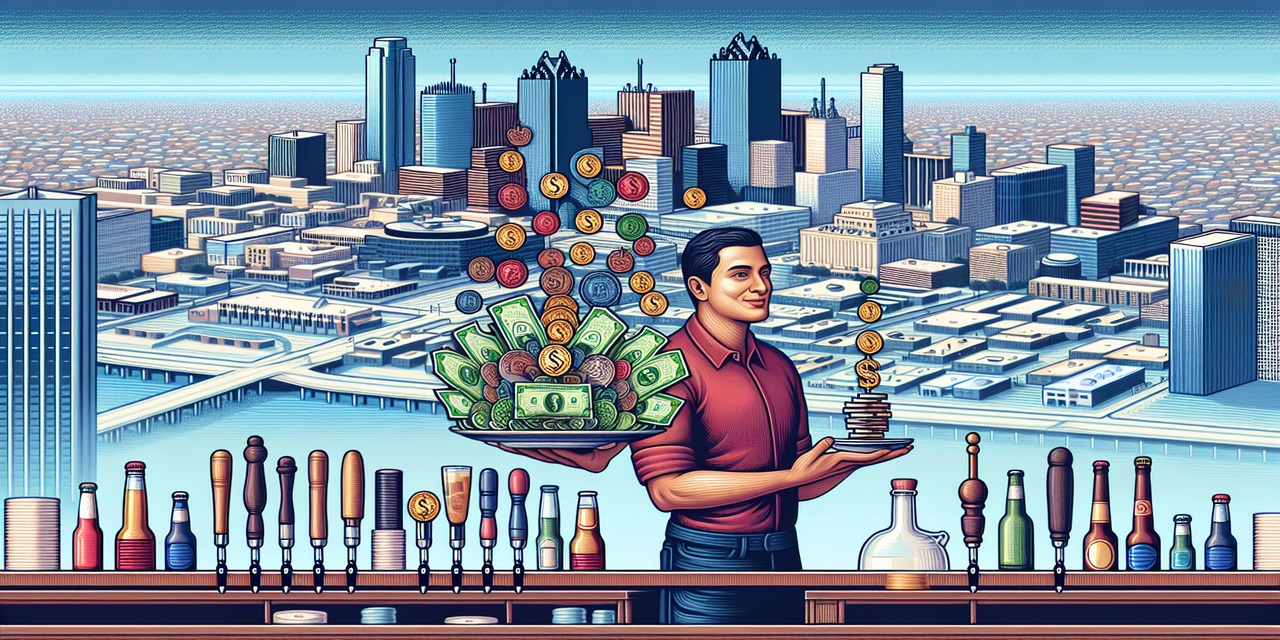Dallas Living-Wage Comparison: Key Takeaways
- Bartenders in Dallas earn an average base wage of $18.52 per hour, with tips boosting total hourly earnings up to $33.59.
- The living wage in Dallas varies by household: $22.06/hour for a single adult, $36.79/hour for a single adult with one child, and about $20.44/hour per adult for two working adults with one child.
- Dallas’s cost of living is slightly above the national average, with higher utilities and healthcare costs balanced by lower housing expenses.
Exploring whether bartender salaries in Dallas can keep up with living wage requirements reveals a nuanced picture shaped by wages, tips, and cost of living factors.
This guide examines bartender earnings against Dallas’s living wage benchmarks to assess financial feasibility.
Employers looking to optimize their team should consider how to hire a restaurant manager to improve overall staff effectiveness and retention.
Bartender Salaries in Dallas vs. the Living Wage
Bartenders in Dallas earn a base wage averaging $18.52 per hour as of mid-2025. However, tips play a crucial role in their total income, with average daily tips around $150. Factoring in tips, bartenders can make between $18.52 and $33.59 per hour.
Annually, this translates to an estimated income near $63,000, which represents a substantial boost over base wages alone.
Learn more about bartender salary ranges and factors that influence pay in this hospitality career.
Despite this, the base wage without tips falls short of the living wage needed for most household scenarios in Dallas.
Living Wage Basics in Dallas
The living wage represents the hourly earnings required to cover essential expenses like housing, food, healthcare, transportation, and other basics. In Dallas, it shifts significantly with household composition:
- Single Adult: $22.06 per hour
- Single Adult with One Child: $36.79 per hour
- Two Working Adults with One Child: Approximately $20.44 per hour each
These thresholds underscore the challenge bartenders face if relying on base wages alone.
Where Bartenders Stand in Relation to Living Wage
If tips are stable and substantial, bartenders can comfortably meet or exceed the living wage for a single adult and even support certain family models.
However, since tips fluctuate based on night, venue, season, and economic factors, relying solely on tips introduces income variability that can complicate budgeting for many bartenders.
Employers can benefit from understanding how to hire a bartender that customers love to ensure consistency and loyalty within their teams.
Considering Dallas Cost of Living for Bartenders
Dallas's cost of living presents a mixed bag for bartender budgeting. Utility costs run about 15% higher than the national average, and healthcare costs are around 3% higher.
In contrast, housing is more affordable, with median home prices approximately $295,100 and two-bedroom rentals averaging $1,500 per month—about 6% below the national average.
This relative affordability in housing can make a significant difference in overall living expenses for bartenders.
Balancing Expenses Against Variable Income
Because tips are a variable source of income, bartenders must carefully plan their finances. Fixed expenses like rent and utilities require steady income, while daily tips may vary.
Developing a cautious budget that builds a buffer during high-tip periods can help manage months with lower earnings.
Bartenders interested in advancing their skills may explore resources such as mixologist job descriptions to enhance their craft and income potential.
Is Bartending a Viable Income in Dallas?
Bartending can indeed provide a viable income in Dallas, particularly when tips are strong and consistent.
For single adults, total earnings including tips often exceed the living wage baseline, making it possible to cover essentials and modest discretionary spending.
However, supporting dependents or larger households through bartending alone may be challenging without additional income sources or assistance due to higher living wage requirements for families.
Factors Influencing Financial Sustainability
- Employment venue: Upscale or popular bars typically yield higher tips.
- Shift timing: Evening and weekend shifts usually generate more tip income.
- Experience and skills: Skilled mixologists may command better base pay or attract more tips.
- Household composition: Larger households require higher household incomes to meet living wage standards.
Employers can improve profitability by learning restaurant owner responsibilities and how they affect staff wages and work conditions.
Tips for Bartenders to Manage Dallas Living Costs
Managing finances wisely is essential for bartenders facing varying income streams and Dallas living costs:
- Create a realistic budget based on conservative tip estimates to avoid shortfalls.
- Build an emergency fund to cover months with lower tip income.
- Consider shared housing or roommates to reduce rent burdens.
- Explore opportunities for supplemental income, especially if supporting dependents.
- Take advantage of employer benefits such as health insurance when available.
For bartenders looking to grow their careers, tips on nailing bartender interviews can help secure better positions.
Resources for Dallas Bartenders on Living Wage and Labor Laws
For further information on wages, labor laws, and living wage standards, bartenders in Dallas can consult official resources:
- U.S. Department of Labor: Fair Labor Standards Act (FLSA)
- Texas Workforce Commission: Labor Law Information
- City of Dallas Official Website
Employers seeking to better understand labor laws should see hospitality job posting compliance tips for smoother hiring.
Dallas Living-Wage and Bartender Salaries: Conclusion
Bartenders in Dallas earn base wages below the single adult living wage but make up for this gap through substantial tipping. This combined income can enable a comfortable livelihood for individuals, though supporting families solely through bartending may be more difficult.
Understanding local living wage requirements, carefully managing variable tip income, and leveraging affordable housing options are key for bartenders aiming for financial stability in Dallas’s environment.
Restaurant owners looking to improve staff retention may find valuable insights in strategies to reduce restaurant employee turnover.

.png)

.png)
.jpg)